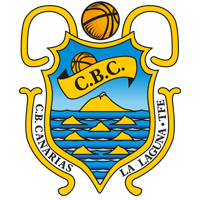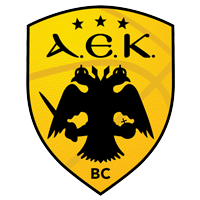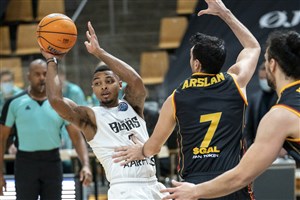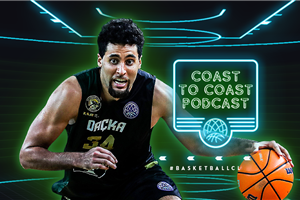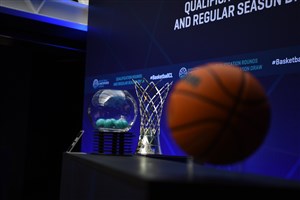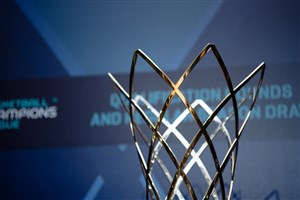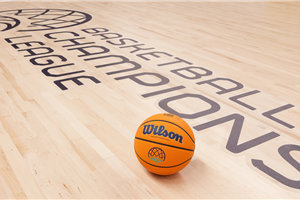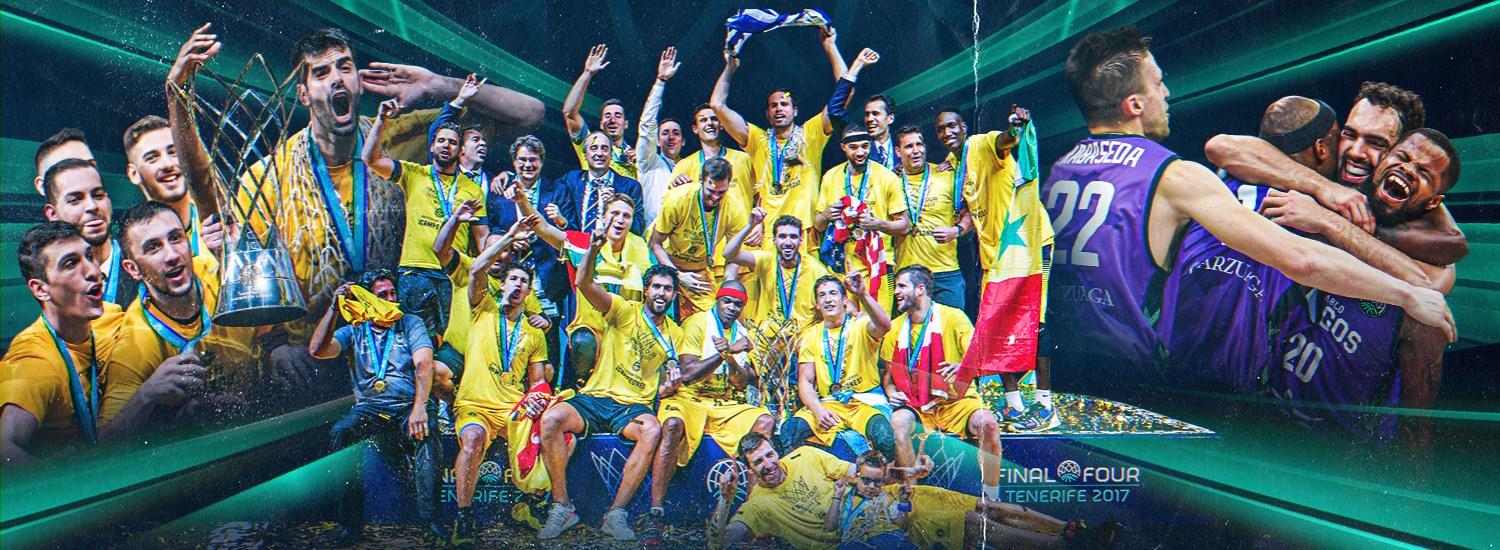
Building a Champion - The general managers of Iberostar Tenerife, AEK, and Hereda San Pablo Burgos know what it takes
MADRID (Spain) - Every year, thirty-two teams start the season in the Basketball Champions League with one common goal: to win a championship. Some have more realistic dreams than others but if we have learned anything from the likes of MHP Riesen Ludwigsburg and Antwerp Giants reaching the Final 4, or San Pablo Burgos journeying from the Qualifiers to eventually becoming champions, the BCL is a competition where anything can, and regularly does happen.
The team that has finally won the BCL every year has been absolutely deserving. Of course, each enjoyed a wealth of talented players, great coaching, and a fair share of luck. Each has, however, enjoyed that wealth as a result of experienced and meticulous planning.
Whilst the players and coach will enjoy the lion's share of the credit for winning a championship, the responsibility for undertaking that planning falls primarily on the shoulders of the club's general manager. We spoke to three of our champion GMs about their journey to the job and what it has taken to build championship teams.
The Journey
AEK's road to the BCL title in 2018 was one of the most turbulent and dramatic we have seen but for GM George Hinas, the journey was also part of a lifelong ambition.
"Well actually I was an AEK fan since very young, following the team and watching every game at home and on the road," Hinas told us, "so, slowly-slowly I got into the organization and during a time in 2011 when the team was going downwards, they got relegated to the second division and it was at that time I was first offered the role of team manager."
The role of TM is more involved in daily tasks than a GM, focusing on everything from practice facilities to transport and player housing. It was the ideal way for Hinas to get his foot in the door and learn the business. It was, however, by no means a role that carried the respect and clamour that comes with being the GM of AEK today - a club that now challenges for major trophies every season.
"At the time I took this position, literally, nobody wanted to take the job," remembered Hinas, "the team had no publicity, nobody cares about a team in the second division here (in Greece) but it was actually the job of my dreams so I took it in a heartbeat."
Of course, we know now after two Greek Cups, a BCL title, and an Intercontinental Cup that decision has been vindicated many times over but that was far from instantaneous. In fact, there was not even a role for a GM at AEK in 2010. Success needed to be built, much like the club itself, and perhaps there was no-one better to build both than a passionate fan.
"At first there was no General Manager and I stayed as the Team Manager for five years," said Hinas.
"When you are involved in this Basketball reality and AEK reality for five years you get to know a lot, it was like a second university for me. So, I would say I got my degree after five years and I was promoted to General Manager when Mr Angelopoulos offered this to me," he explained.
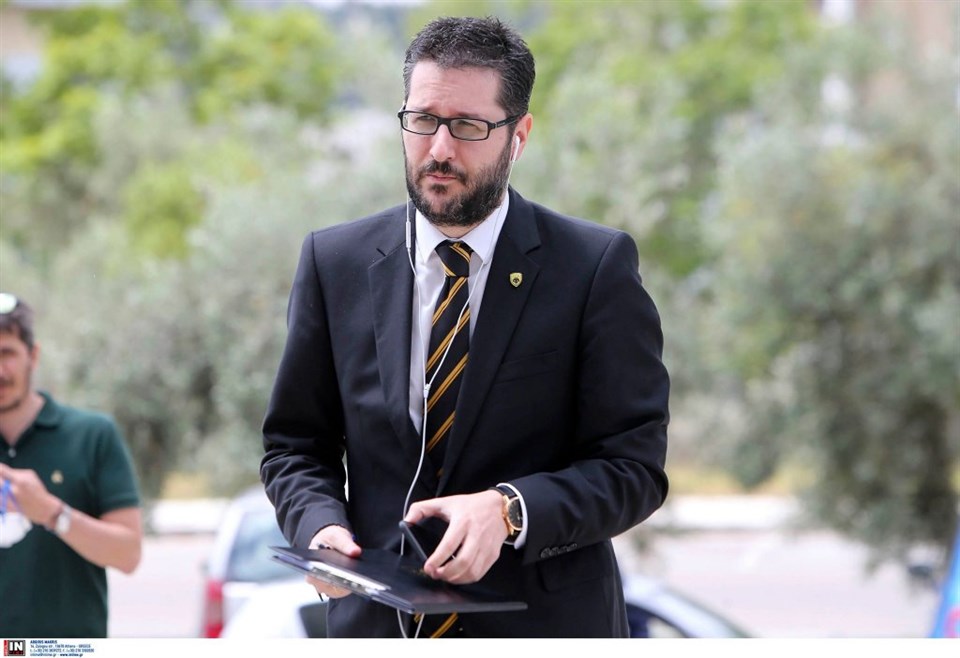 George Hinas appointed as AEK general manager in 2016
George Hinas appointed as AEK general manager in 2016
(credit AEKBC.gr)
For Hereda San Pablo Burgos, the adventure en route to becoming BCL champion was one of sports romance and an underdog spirit. After starting the season in the Qualifiers, the club reached the Play-Offs, then the pandemic hit and a full calendar year later, Burgos found themselves in Athens winning the biggest trophy in the club's short history.
In the case of Albano Martinez, the pathway to becoming their GM was more traditional.
"I was a professional player, my playing career lasted for thirteen years and then I went straight from being a professional player to become a General Manager," he said, "there weren't any middle steps in my pathway."
In fact, there was little in the way of silverware during Martinez's playing career to suggest this kind of instant jump could lead to success in the front office. A single cup trophy in the 2005 LEB 2 (now known as LEB Plata) did little to indicate (from the outside) the makings of a GM that would guide San Pablo Burgos from LEB Gold to the ACB Semi-Finals and a BCL Championship. Especially when you consider all of this happened in their first five seasons as a club.
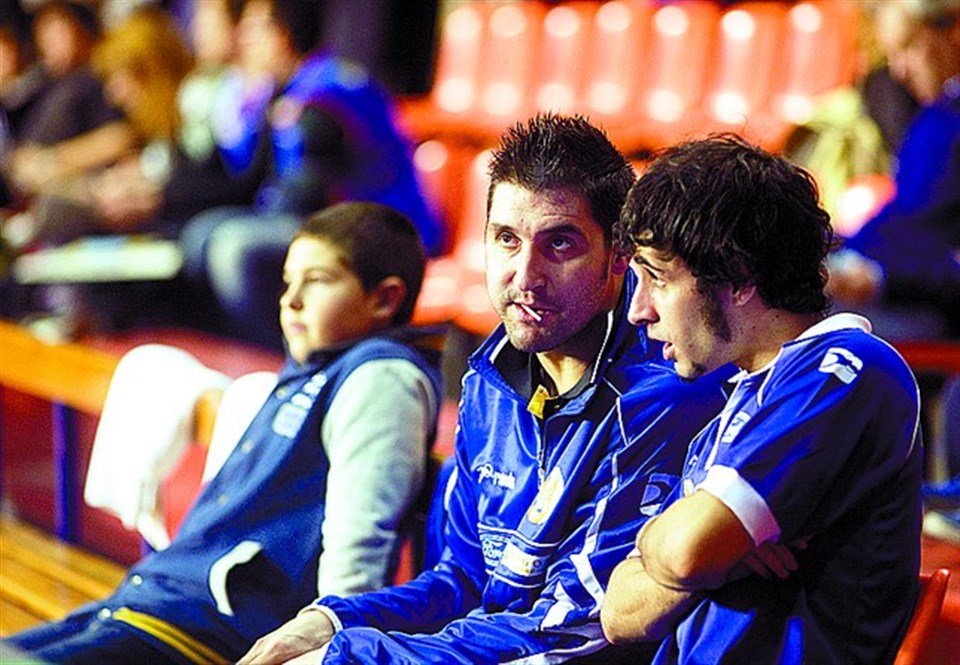 Albano Martinez jumped from his playing career to the general manager's office
Albano Martinez jumped from his playing career to the general manager's office
(credit Diario de Burgos)
At Iberostar Tenerife, they have a saying: Keep calm and trust Aniano. In seventeen years with the club, Aniano Cabrera has seen a steady and methodical kind of progress. It took five years to gain promotion from LEB Silver, and another five to reach the ACB from LEB Gold. Then it was during the club's fifth ACB campaign that it really took another jump by winning the BCL in 2017. It has since won two Intercontinental Cups and twice been semi-finalists in the Copa del Rey, along with another BCL final in the 2018/19 season. Iberostar Tenerife has become a flagship for excellence, both domestically and on the continent.
Like Martinez, Cabrera also started with the club as a player but needed to undertake a few more steps as he climbed the stairs to the GM's office.
"Well, initially I started as a player of the club in lower divisions, then I became part of the technical staff as a team manager and assistant coach in the training teams," said Cabrera, "until I got the opportunity to be the manager of the first team while training for my coaching qualifications and taking courses as a sports manager."
The common theme for all three GMs is a professional life dedicated to a club. Whether it's as a fan or player and team manager guiding the club up through divisions, or being involved with the club since inception, all three have been willing to make the sacrifices necessary to get the club where it needs to be.
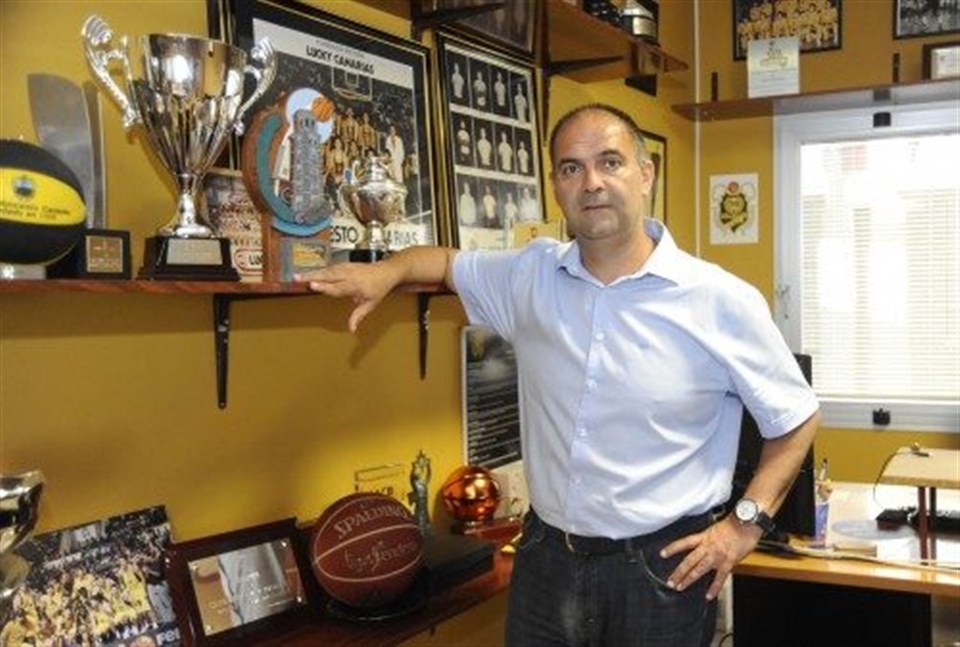 Aniano Cabrera has lived a professional life dedicated to Iberostar Tenerife
Aniano Cabrera has lived a professional life dedicated to Iberostar Tenerife
(credit eldia.es)
"You gotta have passion for your job. This is a job that takes a lot of your free time, with traveling and constant games, you actually have no time for your family sometimes," stated Hinas.
Albano Martinez reaffirmed the point.
"As in many jobs, sacrifice is very important, in order to follow all players, teams, and leagues," he said.
The requirement for passion and sacrifice is not just reserved for the eight months of the season. For Aniano Cabrera at Iberostar Tenerife, the mission is never accomplished. There is always a player to see and something that needs to be done.
"In this General Manager position, let's say that there is no high or low season," said Cabrera, "you are always looking for and seeing possible options for the present and the future."
Sacrifice and hard work are a pre-requisite but on their own are merely keys to the office door. The real work that goes into building a champion happens once you step through. For Albano Martinez success in the role starts with building a network.
"For me, I believe that contacts are very important since they are able to provide you with information that can be valuable, not only to get to know the numbers of a player but also to gain knowledge of some personal aspects of them, which may be very important as well," he said.
"Dragan Sakota is a legend here and I learned a lot working with him. He has this ability to clear his mind and give you the direction you need." (G. Hinas, AEK)
George Hinas prioritizes staying on top of the transfer market as an essential part of the job. Especially in a market as volatile as European basketball.
"Well, I would say you must have full knowledge of the market every single day because this the market changes constantly: Which players are available? Who's going where? Which team needs a certain player? Which players are in the market in the position you need? You really need to know everything about how the market moves," he said.
In such a fast-moving world, with roster and coaching changes happening so often in the season, the role of the GM requires clinical decision making and the ability to see many different angles. it's often impossible to please everyone. One week you could be at a team dinner with a player and speaking about life away from basketball, the next week you may need to cut him. For George Hinas, this is why sticking to a set of ethics is also vital.
"I believe, especially for Greece, integrity is very important. I mean, because this is a very complicated environment and integrity, I would say, is the skill you should have," he said.
He also credited his time working with Dragan Sakota for a lot of the decision-making processes he follows to this day.
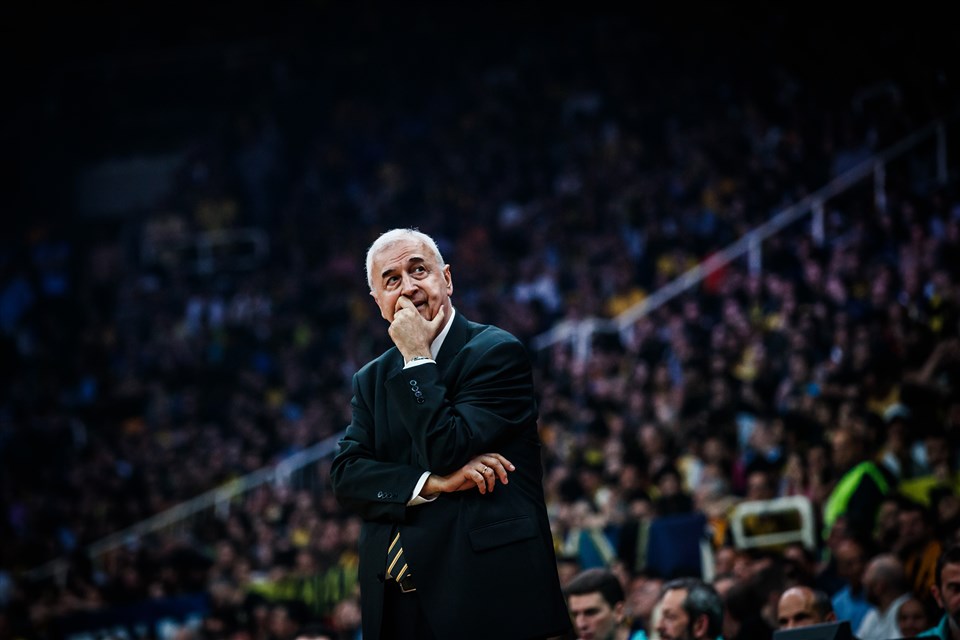 Dragan Sakota guided AEK to one of the clubs most historic seasons
Dragan Sakota guided AEK to one of the clubs most historic seasons
"Dragan Sakota is a legend here and I learned a lot working with him. He has this ability to clear his mind and give you the direction you need. The environment here in Greece is totally a winning and losing mentality, you just have to win every three days and that's it, nothing else. He (Sakota) helped me a lot in terms of building the processes of making the best decisions possible," he said.
Building a Champion
So where did it all begin for our champions? Is there a pattern to be noticed in the way each project was built? Well, the simple answer is no. There were some common threads, in particular the vital role that coaches play for recruitment in the world of European basketball, but each GM also followed differing sets of priorities. Considering the success that Tenerife has enjoyed under the guidance of Txus Vidorreta, it comes as no great shock that Aniano Cabrera places recruiting the right coach at the top of his to-do-list.
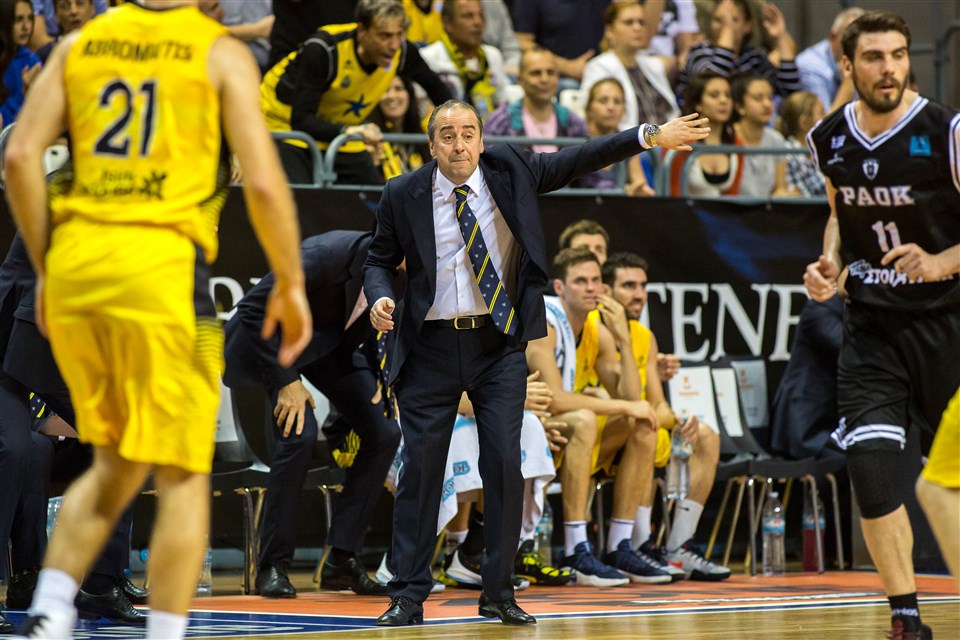 Txus Vidorreta has been at the heart of Tenerife's consistent success
Txus Vidorreta has been at the heart of Tenerife's consistent success
"Hiring the coach should be the first stone of the project and is also the hardest to find," stated Cabrera, before explaining that "with players, the market can give you more opportunities."
For Cabrera and Tenerife, the coach is then the linchpin when deciding which players to recruit.
"The first thing is together with the Coach to see what we need, what players we have, what options we can reach and from there, we prioritize," Cabrera described.
Marcelino Huertas set several records for assists in the BCL last season with 8.1 per game, 138 total, and an outrageous Assist Percentage of 61%. Time and again, those assists found their way to their primary target: Giorgi Shermadini. So, it should also probably come as no great shock to read that everything starts with the point guard and center positions for Tenerife.
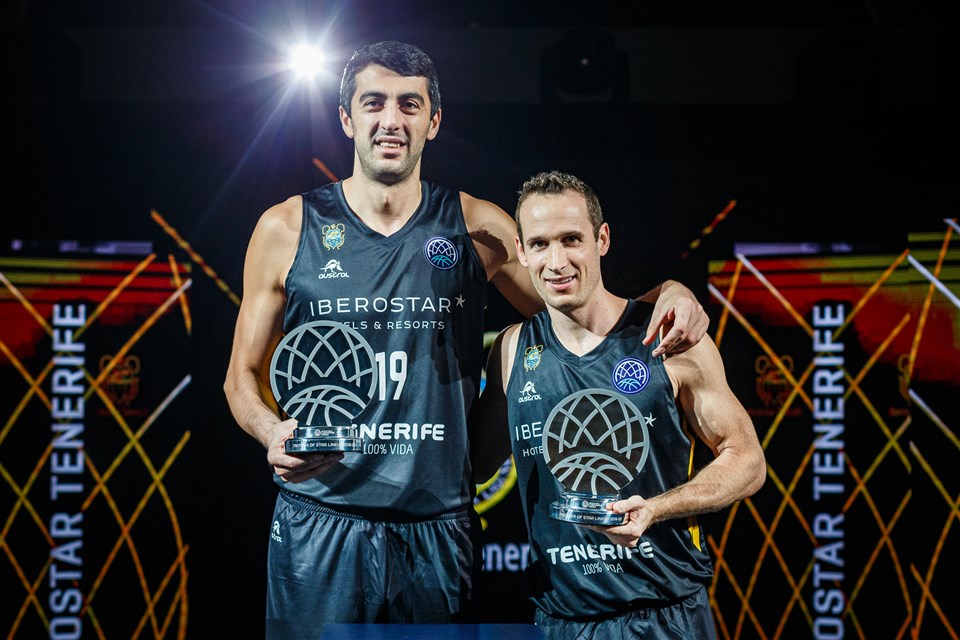 Marcelino Huertas and Giorgi Shermadini are the foundations of this high-flying Tenerife team
Marcelino Huertas and Giorgi Shermadini are the foundations of this high-flying Tenerife team
"The Bases and the Center are the keys," said Cabrera when talking about which positions they build around.
For Albano Martinez, the coach is also important - in particular finding a coach with the ability to cooperate in a strong working relationship.
"You recruit a coach thinking of whom you'll be able to empathize with and work with on a daily basis," said Martinez. "The coach is like the captain of the boat, and then you have to look for the boat's crew members that will do the job in the right way."
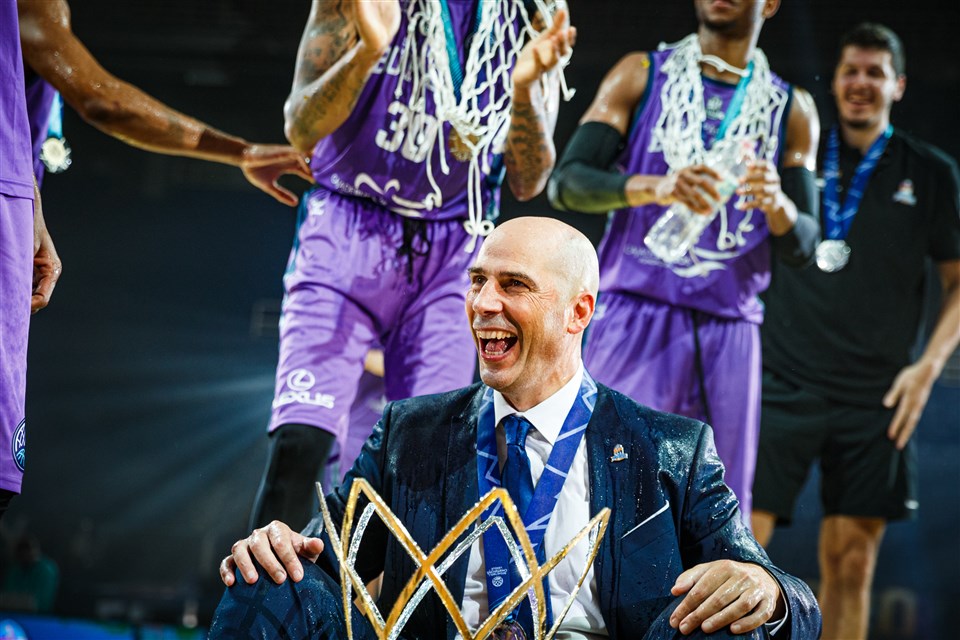 Joan Penarroya navigated Burgos to their first major silverware
Joan Penarroya navigated Burgos to their first major silverware
However, unlike Cabrera at Tenerife, Martinez is also mindful of the potentially transient nature of coaches in Europe and how a squad built for one coach, may not fit another.
"I believe that you have to look for some players that the coach wants, but you can't base it all on what the coach wants," he explained. "If for one reason or another, he leaves the team, then another coach would come demanding different players. That's why I think that you have to keep the coach's opinion in mind, but you have to look after the club’s position first, which is the most important thing after all."
In contrast to Cabrera, Martinez doesn't prioritize any specific position or role in the squad to build around. Instead, he looks to build around a stable base of players.
"You don't go looking for a specific role. You have to know which players will stay with the team, and from there you build the squad," he said.
His point is evidenced by the likes of Thad McFadden and Vitor Benite that were linchpins of the last Regular Season and also stayed on for the Final 8 run.
"I would say (I watch) around twenty-five games per week including domestic competitions. Which is not too much, I know some colleagues are watching much more"
(G. Hinas, AEK)
At AEK, recruitment starts with finding the right profile of imports to work with the more stable Greek contingent of the squad.
"We're looking, you know, more for where we're going to need to bring some imports first," said Hinas, "and regardless of their position, there is no specific position or role that we start from."
They also follow a clear process that starts from analyzing the previous season and - echoing Aniano's Cabrera's sentiments about 'no high or low season' - they constantly refer back to a list of interesting players that is curated during the season.
"So, I mean, the process is three stages, when you're preparing for the next season, you start from the past season, watching games with the coaching staff - it's not only me," Hinas explained, "and when we're watching games throughout the season, we add to a list of interesting names that we have seen."
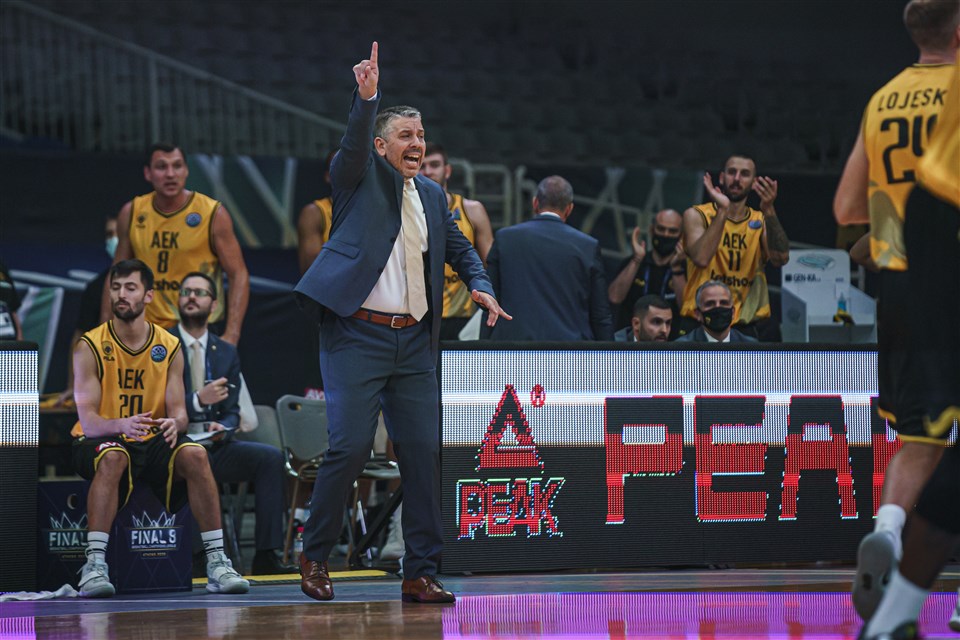 Ilias Papatheodorou reached the BCL Final with AEK in 2020
Ilias Papatheodorou reached the BCL Final with AEK in 2020
If anything, Hinas' description offers a disservice to the volume of work required to build and add to that 'list of interesting names'. And that list is actually more like a database of shortlists in each position.
"I really love the process. I would say (I watch) around twenty-five games per week including domestic competitions. Which is not too much, I know some colleagues are watching more," he said.
Even if you distil a full game down to just action or 'TV Games', each one of those games is likely ninety minutes of work. It doesn't take any complicated math to start to get a clearer picture of the time commitment required to stay abreast of the many leagues in European basketball.
Then comes the waiting game of the NBA Summer League as players jostle for contracts. Those that will be available for the European market enter the next stage of the conversation and at AEK, this is when the most important steps in the process begin: collecting intel and conducting interviews.
"This is the most important part. We're trying to get a minimum of five reports. At least one of those five reports has to be from an ex-teammate. Of course, most of them are from ex-coaches or GMs, but we must get at least one ex-teammate report," Hinas explained.
"It is fundamental to know other facets of the players, such as how they are, or even some important details, if they're married or they have kids, how their lifestyle is regarding their diet, their resting routines"
(A. Martinez, Hereda San Pablo Burgos)
The environment of European basketball presents unique challenges in each different country and navigating these challenges - especially for American players coming from a very different culture - requires a certain mindset and no shortage of character. For George Hinas, the interview process and collecting character reports is vital to understand if a player is suited to the specific pressures of playing in Greece.
"We're checking on very important characteristics, you know, connected with this with this winning, losing mentality," he explained, "you have to be mentally tough - in Greece, you have, I would say fifteen websites and newspapers per day that are going to write something about you."
"When you win, you're like the king, when you lose, you're nobody and you have to be able to handle this," he said.
When you look back at the AEK Championship in 2018, it's clear to see that with the likes of Dusan Sakota, Manny Harris, and Kevin Punter, they were stacked with winners throughout the squad. In the case of Kevin Punter, it's easy to look at him now and see the player that won two BCL titles, a Final 4 MVP award, and finished his last season in the BCL as the all-time leading scorer. That player is easy to identify as a winner. But before arriving in Athens, Punter was in Poland with Rosa Radom and although he was an excellent scorer, there was no guarantee that things would work out the way they did.
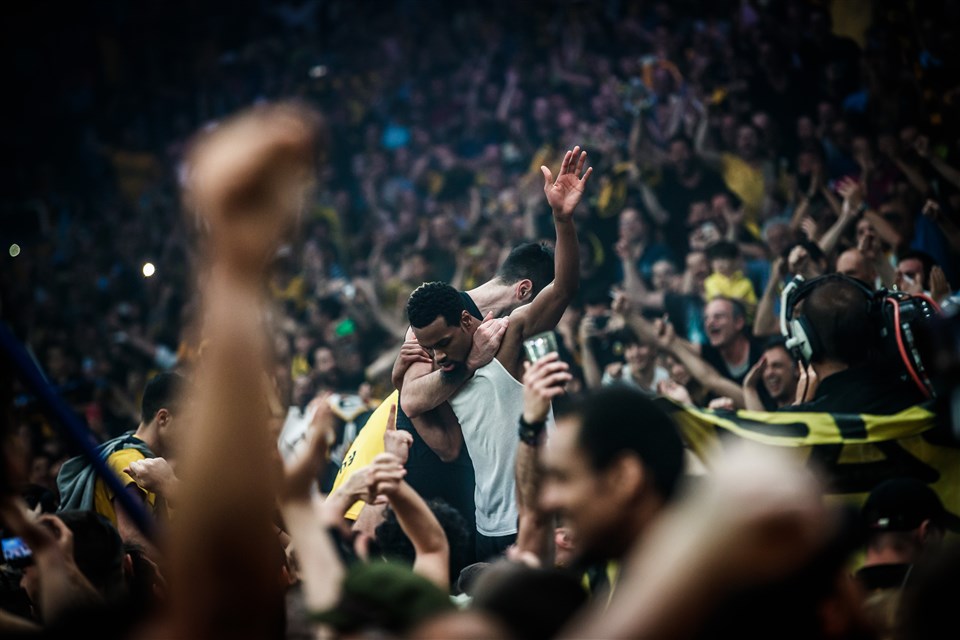 Kevin Punter established himself as a winner in Europe with AEK
Kevin Punter established himself as a winner in Europe with AEK
Hinas maintains that he doesn't judge winners based on their season stats in the box score. Instead, he prioritizes evaluating what players do when it matters the most.
"We look at partial stats the last three minutes of each game, it needs a lot of work to find, but this is very important," he said.
"If you score twenty points per game that doesn't mean you're a winner," he continued. "You have to check when this guy scored all his points, maybe he disappeared in the last three minutes, or maybe he scores twenty points against a small team or a mediocre team, but when it's their big game, he disappears."
The collection of player intel is also a huge part of the recruitment process in Burgos. Whilst performance data can provide objective information about what a player has been able to produce in one environment, it's also about collecting the other information that helps Albano Martinez predict if that level of performance can be repeated in a new environment.
"It is fundamental to know other facets of the players, such as how they are, or even some important details, if they're married or they have kids, how their lifestyle is regarding their diet, their resting routines," Martinez resolved.
"Talent has been our common denominator in all these years, although physicality is prized more and more. But I believe that talent and basketball playing ability should never be lost" (A. Cabrera, Iberostar Tenerife)
If you have watched the repetitive, recruitment success Tenerife have enjoyed in recent years, it would come as no surprise to learn that the profile of the player has to fit the identity of the club but for Aniano Cabrera there perhaps there isn't as much importance placed on knowing the player before they arrive in Tenerife.
"We seek information, we try to approach in a way specifically to assess whether it can be a person that fits the idea of the club, but without obsessing in that area," he said.
When we look at the three, different championship rosters, they are all contrasting in construction. Tenerife were built to fit an identity we have grown accustomed to seeing, with playmaking, power forwards, then Davin White and Marius Grigonis providing the scoring.
AEK relied heavily on more mobile bigs like Vince Hunter and Delroy James, with Manny Harris, Kevin Punter, and Dusan Sakota responsible for keeping the scoreboard ticking over.
Burgos were so successful in Athens with two almost identically composed five-man lineups. Renfroe and Cook dovetailed as the playmakers, with Benite and McFadden running relentlessly off screens to shoot the ball. Dejan Kravic operated as the gravitational pull creating space for shooters.
"Well, I believe a successful team, a winning team, needs to have fifteen totally different players," said George Hinas when discussing his ideas on roster construction. "We don't need two players that do the same thing, even if they do it in the best way possible."
San Pablo Burgos looked at the circumstances caused by the pandemic and opted for experienced players that had the stability to perform consistently in very unstable environments.
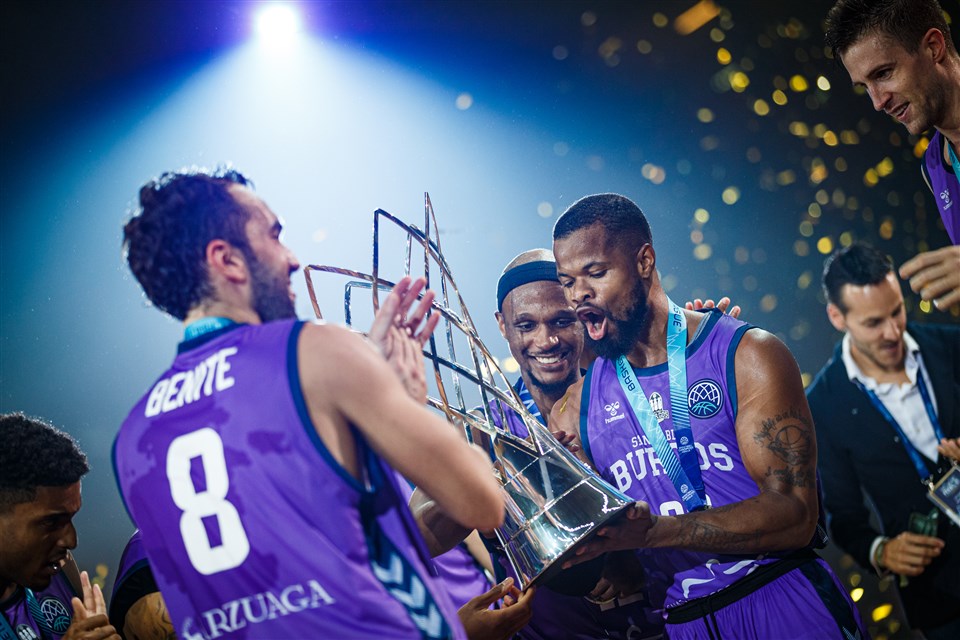 Burgos decision to lean on experienced players paid off in the 2020 Final
Burgos decision to lean on experienced players paid off in the 2020 Final
"For the Final Eight, we knew we had to hire (more) experienced players than previous seasons because we were facing an important tournament very early in the season," Albano Martinez told us and then explained that this policy was also designed to continue from the Final Eight into the new season.
"There were some circumstances that made this year different than others," he explained."With the pandemic and the games behind closed doors, we thought that maybe those experienced players could help us lead the group in a better way."
This focus on experience - especially during these uncertain times - is a trend we are observing across the BCL this season. In the reduced format of the Regular Season, every win is vital and teams are proving reluctant to give young players the minutes we have seen during years past. In AEK, where the pressure to win is a constant, opportunities for youth players are always at a premium - only the highest-level young players such as Nikos Rogkavopoulos saw meaningful minutes in the big games last season.
"Well, first of all, about youth players, in our roster of fifteen players, I don't think you must have more than two youth players," Hinas explained.
Instead, his preference is to send players to less pressured situations where they can learn their craft.
"I prefer to send them on loan in order to get more minutes," he said."It's very important for them to get on the court playing as early as you can."
At Iberostar Tenerife, they have a saying: "Keep calm and trust Aniano".
Even if a team manages to successfully recruit all the players that they have identified, it very rarely works to plan. As Hinas and Cabrera mentioned earlier, the work is never done. We regularly see GM's and coaches dip back into the market mid-season, or even late-season with the hopes of finding the final piece to the jigsaw puzzle.
In the cases of AEK and Burgos, both championship squads required more than a little home improvement during the season. This wasn't an unexpected surprise for George Hinas.
"You have to take into consideration that it's not easy to achieve 100 percent chemistry with your starting group, I have never seen a team being successful in the Play-Offs with the exact same team that started its pre-season in August," he told us.
"So you've got to be aware that the third stage of recruiting will be during the season."
AEK not only changed players during that season, but they also had to go through the upheaval of changing their coach when Dragan Sakota came to the club in September.
If there ever was a club that could contradict this point and achieve success with the team recruited in August, it would probably be Iberostar Tenerife.
An appropriate word to describe the recruitment style for Tenerife would be continuity. Even when they changed every member of the squad at the start of the 2019/20 season the basketball product on the floor almost instantly looked like 'Tenerife Basketball'. Aniano Cabrera was cagey in his responses about how they identify player profiles and structure rosters but he did highlight one factor that championship teams have that others don't.
"Talent," he stated."It's been our common denominator in all these years, which in these last seasons, in my opinion, has been lost in the BCL, physicality is prized more and more," eschewed Aniano Cabrera, "and I believe that talent and basketball playing ability should never be lost."
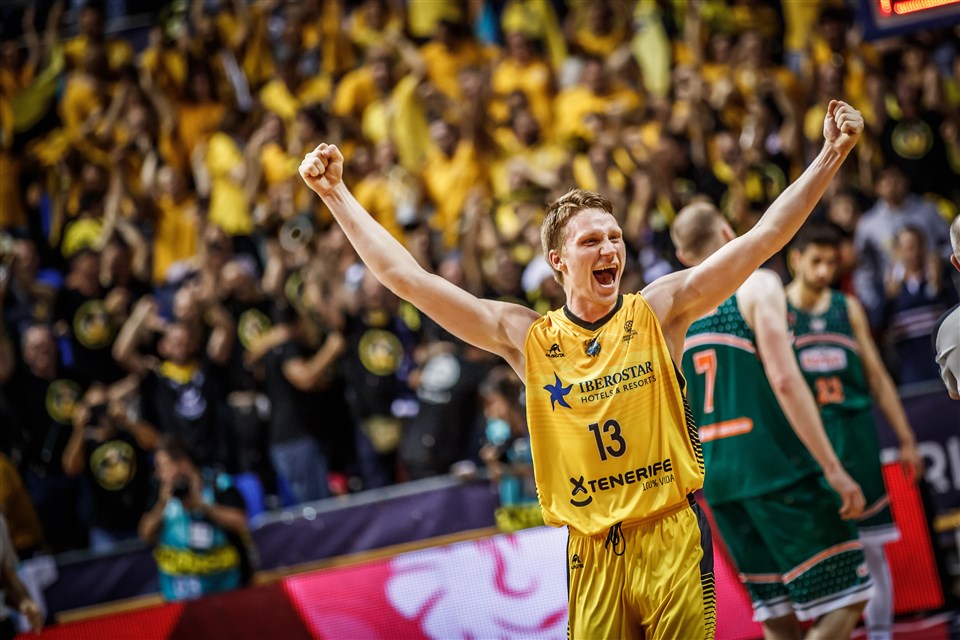 Marius Grigonis is one of the most talented players to play for Tenerife and won the Final Four MVP
Marius Grigonis is one of the most talented players to play for Tenerife and won the Final Four MVP
For Albano Martinez, the difference lies in respect for the process within the group.
"The main element is daily work, that's key. It builds this trust between players and the technical staff that makes all of them believe in what the coach tells them," explained Martinez when describing what makes a team champions.
Since taking over as GM in 2016 George Hinas has seen no shortage of talent pull on an AEK jersey but for him, it's all been about relationships and chemistry when it comes to winning.
"You're not going to play good basketball or you're not going to win if you don't have a good relationship outside of the court," he said.
"Respect is the first word I would like to use the second one is personality," he continued. "Players with personalities step on the court with a different mentality. And, you know, they guide you to the next step, to the next level."


